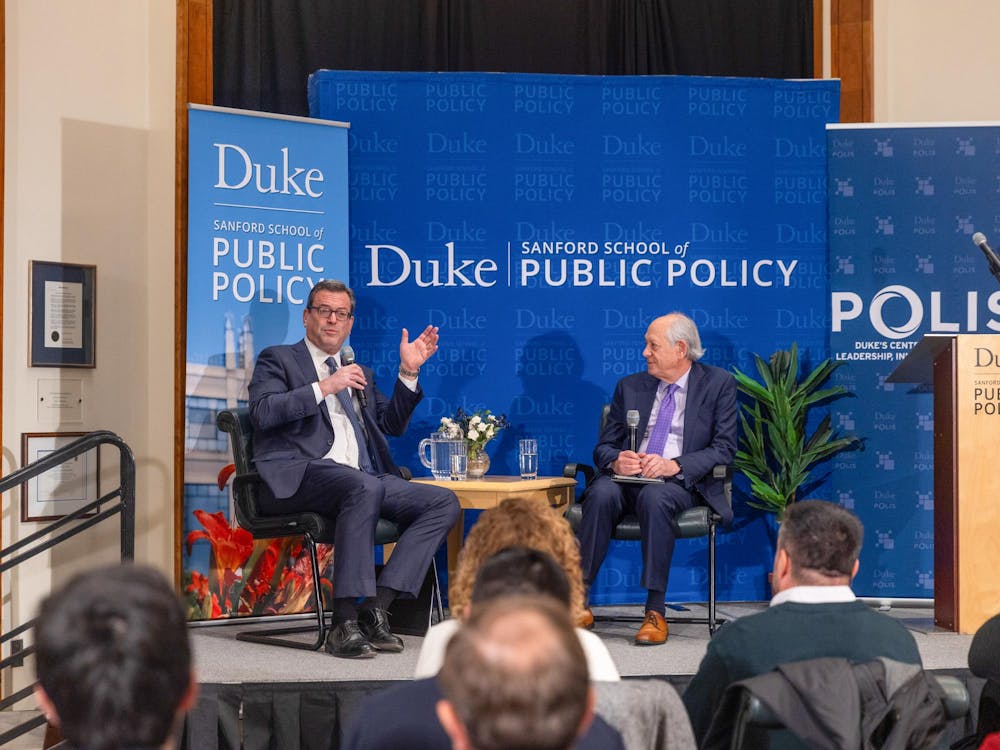Barry Berke, Trinity ‘86 who advised the U.S. House of Representatives during the Trump Impeachments, reflected on the importance of respecting election integrity in the Sanford School of Public Policy’s fall 2024 Robert R. Wilson Distinguished Lecture.
Berke is most well known for acting as special counsel to the Judiciary Committee of the U.S. House of Representatives during the first investigation and impeachment of then-President Donald Trump in 2020 and later as chief impeachment counsel to the House during Trump’s second impeachment in 2021. He currently serves as co-chair of multinational law firm Gibson Dunn’s litigation practice group and a member of its trials and white collar defense and investigations practice groups.
The event, which was held Monday evening at Fleishman Commons in the Sanford School, was also sponsored by Duke Law and Duke Centennial and featured an address by Berke and a Q&A session moderated by Donald Beskind, professor of the practice of law.
Berke opened his talk by reminiscing on his time as an undergraduate in the Sanford School, where he received his “first election education” volunteering for former N.C. Gov. Jim Hunt’s Senate campaign, a contested race that he lost.
The experience prepared him for a long career providing legal advice on election-related cases, though he doesn’t refer to himself as an “elections lawyer,” only someone who “get[s] involved when folks think it may matter.”
According to Berke, many Americans thought the 2024 presidential election would be one of those times.
“Both sides leading up to this election were preparing for the fight of the century that they thought could really test the limits of our democracy and our election system,” he said.
However, widespread claims of election fraud like those seen after the 2020 and 2016 election cycles did not materialize this year. Berke attributed this shift to the lack of a “razor-thin margin” in the 2024 presidential election, which he identified as the key determinant of when such “tests” will take place.
As an example, he pointed to the 2000 election, which saw a drawn-out counting process after a close race between Republican candidate George W. Bush and Democratic candidate Al Gore.
Berke expressed that such election disputes have a long tradition in American democracy. He called back to the contentious presidential election of 1800, where the race between Thomas Jefferson and Aaron Burr resulted in a tie. The complications that ensued eventually prompted changes to the electoral process, and the separation of presidential and vice presidential races, through the ratification of the 12th Amendment in 1804.
“It’s the razor-thin elections, the ones that are so close, that determine the limits of the law,” Berke said.
More recent disputes have centered around claims of fraud, with a rise in accusations that voting machines reduce the accuracy of ballot counts, a claim that has been repeatedly refuted by election officials around the country.
In 2016 and 2020, election fraud arguments focused on the possibility of foreign interference.
Following Trump’s victory over Democratic candidate Hillary Clinton, which Berke referred to as “in some ways … the greatest upset in the history of presidential elections,” evidence emerged that Russian officials had communicated with members of the Trump campaign to influence the election’s outcome, namely through the release of hacked emails from the Clinton campaign.
The claims eventually led to an investigation by the House Judiciary Committee in 2019. Berke recalled that he thought the inquiry had ended after then-Special Counsel Robert Mueller testified that there was “not sufficient evidence” of foreign interference in the 2016 election. But the next day, it was reported that Trump asked Ukrainian President Volodymyr Zelenskyy to release damaging information about former Vice President Joe Biden, who was at that point Trump’s prospective Democratic challenger for his 2020 reelection bid.
Berke described the 2020 election that ensued as simultaneously representing the “high point” and “low point” of American democracy.
“The states really … stepped up,” he said. “They passed new laws, they expanded mail-in ballots, they allowed things like drive-in voting, drop boxes and other procedures to allow people to vote — most of which was done on a bipartisan basis.”
These pandemic-era changes resulted in record-breaking voter turnout rates across the country. However, 2020 also saw “really unprecedented attacks on the integrity of the election.”
“The 2020 election normalized raising allegations and hoping the proof follows,” Berke said.
Berke said he represented the states of Pennsylvania and Michigan and advised a number of other states on election fraud cases in the aftermath of that election cycle, noting that 62 such lawsuits were filed across the country at the time. He pointed to the court system as “a very effective institutional guardrail” during that process, as 61 of those cases were ultimately rejected as unfounded.
Questions around election integrity still persist today, and in Berke’s view, such disputes will always be part of the American democratic process. He explained that while new laws and standards may reform the electoral process, they also open the door to new areas for legal challenges.
But despite the “high state of partisanship” Burke sees today, he thinks Americans can still unite around the importance of democratic elections.
“I think for all of us, whether our candidate wins or loses, what we can do is help spread the gospel — that it really does require regular folks all over the place to recognize the importance of our elections and respect the integrity of the process so that, again, when people vote, … they can have confidence that their vote will matter and that our democracy actually works,” Berke said.
Get The Chronicle straight to your inbox
Signup for our weekly newsletter. Cancel at any time.

Zoe Kolenovsky is a Trinity junior and news editor of The Chronicle's 120th volume.

